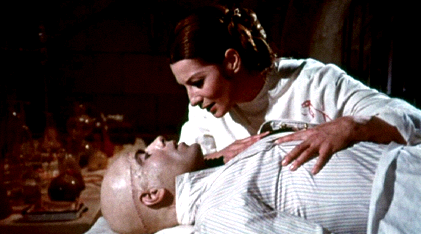Directors: Mel Welles, Aureliano Luppi (uncredited)
Writers: Dick Randall, Mel Welles, Edward Di Lorenzo
Producer: Mel Welles
Cast: Rosalba Neri (as Sara Bay), Joseph Cotton, Paul Muller, Mickey Hargitay, Herbert Fux, Marino Masé (uncredited), Riccardo Pizutti (as Peter Whiteman), Renate Kasché (as Renata Cash), Lorenzo Terzon (as Lawrence Tilden). Ada Pometti (as Ada Pomeroy), Gaultiero Rispoli (as Richard Beardley), Joshua Sinclair (as Johnny Loffrey), Andrea Aureli (as Andrew Ray), Petar Martinovic (as Peter Martinov), Adam Welles, Herb Andress (uncredited), Romano Puppo (uncredited), Allesandro Perrella (uncredited), Ferruccio Fregonese (uncredited)
In nineteenth-century Europe, Tania Frankenstein (Rosalba Neri) has finished her medical studies and returns home to her father, Baron Frankenstein (Joseph Cotton). Tania is now a licensed surgeon and wishes to collaborate with her father on his medical experiments. The Baron is on the verge of completing his life’s work to endow life to a being (Petar Martinovic) he has assembled from pieces of various human cadavers. When the Baron brings his creation to life, it immediately kills him and wanders off. Tania carries on her father’s work by creating a second creature to destroy the first.
The Flashback Fanatic movie review
However, by the '70s, the Gothic horror of Britain’s Hammer Films was becoming all too familiar. As films were allowed to become more explicit in their content, Hammer had to follow the trend rather than create one to stay relevant at the box office. Their films became a bit bloodier and a lot more sexual. Those were the contemporary currents animating Italy’s answer to Hammer: Lady Frankenstein.
The title of this film and its tagline (“Only the monster she made could satisfy her strange desires!”) tells us all that we need to know to distinguish this Frankenstein film from those that had gone before. That’s exploitation, folks! All that remains is to see just how far it will go.
Lady Frankenstein checks off all the boxes to make it a sexy variation on the Hammer style Gothic horror film. While it does hold one’s interest with a few good dialogue scenes, monster mayhem, sex, and Rosalba Neri’s sultry beauty, the film’s overall execution is a bit muddled. There are a lot of awkward edits that abruptly cut away from scenes the split second that the action or dialogue is finished. Then there is that final reveal of Tania Frankenstein’s intentions that is supposed to be some sort of surprise betrayal that still has me scratching my head in confusion. Perhaps something was lost in the Italian-to-English translation, but the monster seems just as bewildered as I am.
As Baron Frankenstein, Joseph Cotton is the big name topping the cast list. At this late point in his career, Cotton had also appeared in a couple of other European fright flick favorites, The Abominable Dr. Phibes (1971) and Baron Blood (1972).
There are a few other familiar faces to fans of Euro-horror in the cast. Herbert Fux has some of the best lines (at least in the English dub) as the drunk and debauched grave robber, Tom Lynch. Paul Muller plays Baron Frankenstein’s assistant, Charles Marshall. Bodybuilder-turned-actor Mickey Hargitay appears as cynical police investigator Harris. Curiously, Marino Masé receives no billing. He plays the important role of Thomas Stack, the slow-witted stable boy that figures prominently in Tania Frankenstein’s plans.
This film was my introduction to that sexy icon of Italian genre films throughout the '60s and '70s, Rosalba Neri. Her dark beauty would cast a sexual spell on the viewer in any role she played, and that is just what is required in Lady Frankenstein. She is also able to project an obsessive determination and intelligence that makes us believe she is both a siren and a scientist. I can’t be certain, but here she may have played the first character in cinema to orgasm during a sex partner’s murder.
Aside from the gender switch of the main scientist in this Frankenstein film, the other novel ingredient is the women’s lib sensibility addressed by Tania. She is conscious of her daring in achieving a medical education in a male dominated society. There are some that criticize this film as vilifying a woman for being determined, educated, and sexually aggressive. However, those are exactly the same qualities that Peter Cushing’s amoral portrayal of Baron Frankenstein had in the Hammer Films Frankenstein series. If a man behaving badly can be shown to be the villain, so can a woman; that’s equality.
Ultimately, Lady Frankenstein is almost entirely motivated by the attention-getting gimmick of a beautiful woman in the role of a sexy mad scientist. If you want to complain that such a character also has to get naked, well, you got me there. Although Peter Cushing is one of my all-time favorite actors, I must admit that Rosalba Neri is much more qualified to ditch her lab smock and play doctor with her creation.















No comments:
Post a Comment